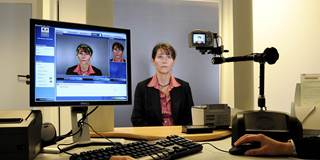The collection and storage of people’s biometric data fundamentally changes the relationship between citizen and state. Once “presumed innocent,” we are now, in the sinister words of former UK Home Secretary Amber Rudd, “unconvicted persons.”
WASHINGTON, DC – Technological developments in recent years have highlighted not only the benefits of big data, but also the need to come to terms with the dangers it poses to our privacy, civil liberties, and human rights. Nowhere is this question more relevant than with the latest source of that data: our bodies.
Law enforcement authorities around the world are building and using technologies to identify us from our biometrics, including our face, fingerprints, DNA, voice, iris, and gait. Long used in passports and at border crossings, these unique identity markers have many other applications.
For years, we have allowed governments and companies to gather and analyze our biometric data whenever we have applied for a driver’s license, a travel visa, naturalization, or certain jobs, or even simply gone to an amusement park. Increasingly, we use our fingerprints or our face to unlock our smartphones, pay for purchases, and board airplanes.

WASHINGTON, DC – Technological developments in recent years have highlighted not only the benefits of big data, but also the need to come to terms with the dangers it poses to our privacy, civil liberties, and human rights. Nowhere is this question more relevant than with the latest source of that data: our bodies.
Law enforcement authorities around the world are building and using technologies to identify us from our biometrics, including our face, fingerprints, DNA, voice, iris, and gait. Long used in passports and at border crossings, these unique identity markers have many other applications.
For years, we have allowed governments and companies to gather and analyze our biometric data whenever we have applied for a driver’s license, a travel visa, naturalization, or certain jobs, or even simply gone to an amusement park. Increasingly, we use our fingerprints or our face to unlock our smartphones, pay for purchases, and board airplanes.